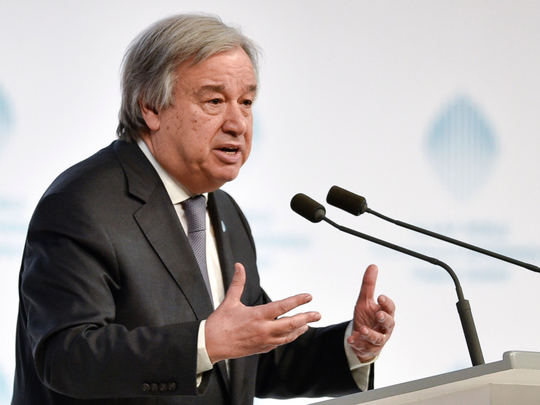
Unconfirmed media reports allege that the new United Nations Secretary-General, Antonio Guterres, called the former Israeli Minister of foreign affairs Tzipi Livni and offered her the position of under-secretary-general for political affairs. This was, apparently, made to sooth his earlier initiative to appoint former Palestinian National Authority (PNA) prime minister Salaam Fayyad to serve as his envoy to Libya — a call that Washington vetoed but may rescind under the right circumstances.
Objections to both personalities were raised, but the key question that lingered was whether the world was ready to finally deal with the Arab-Israeli question in an impartial way.
Part of the senior management group of UN under-secretaries, the post of under-secretary-general for political affairs is one of the most senior within the UN system, normally appointed by the UN General Assembly on the recommendation of the secretary-general for a renewable term of four years. There are several such positions though none as sensitive as the one allegedly offered to Livni.
Current officials holding the rank include Helen Clark, a former prime minister of New Zealand who heads the United Nations Development Programme, Ertharin Cousin, an American ambassador who runs the World Food Programme, and Zeid Bin Ra’ad Zeid Al Hussain, a Jordanian Prince who commands the Office of the United Nations High Commissioner for Human Rights. UN under-secretaries perform vital tasks and are elected by the General Assembly although the five permanent members of the Security Council can veto an appointment for reasons they only know.
Livni has had a chequered record in Israel as she served in various intelligence services, including the Mossad, changed political parties four times in nine years — Likud (1999-2005), Kadima (2005-2012), Hatnuah (2013-2015) and Zionist Union [an off-shoot of Hatnuah] (2015-until now) — and most probably reached the end of her political career. One Israeli observer noted that “her American supporters are out of power”, and the party she helped create, Hatnuah, which evolved into Zionist Union in 2015, was unlikely to win any seat in the next elections because of complicated alliance mechanisms in place.
Past allies, like Ariel Sharon and Ehud Olmert, are now gone too, which effectively means that it is highly unlikely that Livni may secure a seat in parliament, much less serve in a future government. Under the circumstances, the UN post is attractive.
It remains to be seen, of course, whether members of the UN General Assembly will elect her, though a trade-off between her elevation and that of Fayyad cannot be ruled out. The new US Ambassador to the UN, Nikki Haley, expressed her own disappointment over Guterres’ choice of Fayyad as envoy to Libya, making an extraordinary declaration in which she claimed that the world body has for far too long been “unfairly biased in favour of the Palestinian National Authority to the detriment of [US] allies in Israel”.
Fayyad has also had a chequered background, though his six-year-long service as the International Monetary Fund’s representative to the PNA led many to assume that he turned a blind eye to various financial infractions.
Naturally, Israelis despise Fayyad and consider his support of both Yasir Arafat and Mahmoud Abbas, as well as backing of Fatah and Hamas, as tantamount to being a terrorist, though such a label is both inaccurate and trivial. What many objected to was his allocation of financial stipends to Palestinian families whose members were held in Israeli prisons as if these individuals had no rights.
Still, the UN trade-off may shed light on hidden agendas, as Guterres attempts to resuscitate the “two-state solution” to save what is left of Palestine. For their part, Israeli extremists believe that this approach is tantamount to creating parity between Israel as a state, and the PNA they consider to be nothing more than a terrorist organisation, even if it sits at the UN.
This is highly regrettable because it highlights that many Israelis are not ready for peace. Even worse, those Israelis that offer to “balance” the UN’s embrace of Palestinian rights are perceived as enablers. Livni may be among them and that is why the reaction to her potential elevation to a sensitive UN post was not welcomed by diehard opponents though she and Fayyad, if and when they are confirmed to the two posts discussed above, will need to work together.
There are those who are persuaded that Guterres intends to bring in Livni from the “Israeli Cold” into the UN precisely to help limit the double, triple and even quadruple standards that favour Israel, with unadulterated US backing. His vision is to trust Fayyad with a highly sensitive post in Libya too, perhaps as the first of such designations to other Arab officials, all to help initiate permanent channels of communication among warring factions.
Dr Joseph A. Kechichian is the author of the just published The Attempt to Uproot Sunni Arab Influence: A Geo-Strategic Analysis of the Western, Israeli and Iranian Quest for Domination (Sussex: 2017).








